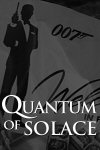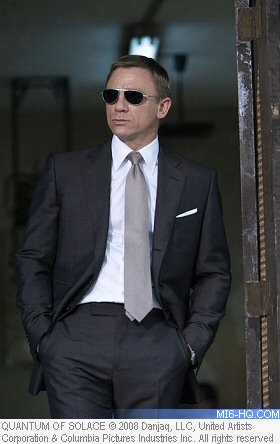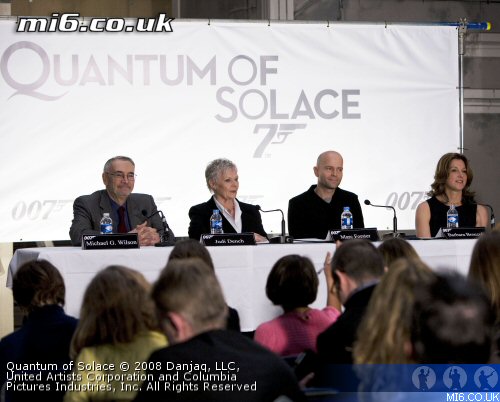 |
| |
Michael G. Wilson and Barbara Broccoli
talk about producing Daniel Craig's
second
outing
as 007
in
the 22nd James
Bond
film
"Quantum of Solace"...
|
|
Producers Interview
21st November 2008
Producing team Michael G. Wilson and Barbara
Broccoli have been at the helm of the James Bond franchise since
Pierce Brosnan's debut as 007 in 1995's "GoldenEye". After successfully
introducing another new Bond in the form of Daniel Craig in the
2006 blockbuster "Casino Royale", expectations for the 22nd film
in the series could not have been higher. Broccoli and Wilson
sat down to discuss this task shortly after filming on "Quantum
of Solace" had wrapped.
|
How does it feel now you have finished
filming?
BB: Great, thanks. We’re going to see the director’s cut in a couple
of weeks and then probably lock the picture in about a month.
MW: We finished on time, 103 days, which is fantastic. Which is short actually,
it’s usually 109 and more. But this time it was103 and it didn’t
go over. Second unit had weather problems and different things, but it was good.
You’re obviously used to filming
in exotic locations with Bond but did this shoot present
any particular challenges?
MW: Everyone was challenging in its own way. We expected Colon to be more difficult
than it was. It was logistically difficult but the filming went very smoothly
considering we were in a part of the world that is a little remote.
Because presumably some these places are not used to having
film crews there?
BB: Well that’s right. And the aerial unit was challenged in lots of ways - the
weather was very bad and what they were doing was very complicated.
MW: It was very high winds, which were difficult to fly in, and cold desert,
shooting in January and February in Baja California in Mexico. |
|

|
BB: And they don’t have a big film infrastructure in Panama
so that was challenging in itself but we had a very good experience
there. And Colon, which is outside Panama City we choose because
of the look of the place- which is extraordinary, it really
is one of the most amazing places you’ve ever seen. And
before the Panama Canal was built it was the main port where
all the trading went on and it has astounding architecture but
with the Panama Canal the centre of trading moved and it was
left abandoned and sort of in disrepair. So there were a lot
of challenges there to make it possible to shoot. But the community
there were very helpful to us - we had to displace quite
a few people for a period of time and they were very co-operative
with us there. Chile we were shooting in the Atacama Desert,
which is the driest place on Earth at an extraordinary facility.
MW: It’s the southern observatory. Several countries joined
together to build an observatory there so there are all these
telescopes at this location and they have an hotel there - actually
it’s not really an hotel, it’s more a facility to
house the astronomers who come from all over the world who get
their time on the telescopes, four days, two weeks, whatever
it is, and it’s something they have to bid for because
it’s highly sought after. And of course just as your time
comes to utilise the telescope a movie company moves in (laughs)
Do you show the observatory in your film?
MW: No, we don’t. We used the hotel where they stay.
BB: Which is beautifully designed but because they are up all
night looking at the stars the bedrooms are subterranean because
they want to sleep and they don’t want any light pollution.
So we were shooting during the day, which is of course when everybody
is asleep so that was challenging.

Above: Michael G. Wilson, Dame
Judi Dench, Marc Forster and Barbara Broccoli at the
first press conference for "Quantum of Solace" at
Pinewood Studios in January 2008.
|
Tell me what you can about the story. Does it continue immediately
after Casino Royale finished?
MW: Yes, about an hour later. Bond is pursuing the people behind
Vesper’s betrayal and her death. He is tracking them down
and the mystery unfolds. He runs into CIA people later who are
very ambivalent about their role in all of this. And a group
of people called Quantum, an organisation no one has heard of
but nevertheless seems to be involved in controlling scarce resources
in the world.
I like the title. It’s beguiling…
MW: (laughs) I’m glad you do. The people who have to market
the film aren’t quite sure what we’re doing.
BB: It’s certainly unique and it’s from Fleming and
it’s not derivative. I mean, how many times can you have ‘kill’ or ‘die’ or ‘Another
time’ or whatever.
It also seemed to fit in with the new ethos you have with the
films..
MW: Who knows, The Hildebrand Rarity may be coming next! (laughs).
That’s about the only title we haven’t used.
When you were planning Casino Royale did you always know that
you would continue this one immediately after it?
MW: I think the writers came up with the idea that Bond would
be searching for who was behind her death. The idea that it would
follow on immediately came a little later but it was always the
concept that this would be a continuation. In Casino Royale we
left him in a very dark place and it needed to be a story that
would take Bond to the next step and you couldn’t just
have him suddenly pop up without referencing this somehow.
BB: He’s still evolving.
Was it liberating or scary not having a Fleming book to use
as source material?
BB: (laughs) Not liberating! Are you kidding me? I’d love
to bring him back and handcuff him to the typewriter. Not liberating
in the slightest.
MW: It’s good to have a template.
As keepers of the flame you are the arbiters
of what these films are all about, so if a screenwriter is
doing something you can
say ‘that’s the wrong direction..’
BB: We say it all the time. It’s very challenging; for
the writers, for us, for everyone involved. We are the victims
of the prior success and the bar is set very high.
MW: And some people aren’t used to collaborating to this
extent so it can be difficult for them.
How was Daniel on this film?
BB: He goes from strength to strength. His endurance, his discipline,
his enthusiasm, never wanes, not even for a second. It’s
really quite embarrassing for the rest of us (laughs). These
schedules are very difficult and they are very hard. It’s
six days when you are on location and for him it never stops
because even when he’s finished shooting he goes and
he prepares and he does a lot of physical training or training
for specific things - like flying a plane or driving
a boat or doing car stunts. So he is constantly rehearsing.
MW: He is always rehearsing on his rest day or going to the gym.
BB: I think he really is at the peak of all of his abilities
and talents; he’s really on top of his game.
There was so much publicity when you choose him to play Bond
and then Casino Royale came out and proved the snipers wrong.
That must have been so satisfying for you.
BB: Yeah, it was a little bizarre that people were criticising
something they hadn’t seen - and the fact that the Press
kind of capitalised on that. But we just got on with the business
of making a movie and we certainly knew how fabulous he was because
we were seeing the dailies and how great the movie was turning
out. It was upsetting because you are all human beings and the
scrutiny was just ridiculous but it didn’t alter anything
we were doing. We just continued making the movie.
MW: It’s just unfortunate when that is around and it’s
hard to ignore so when you are focused on making the film, especially
for Daniel. You try and ignore it.
BB: We were irritated because we were thinking that this guy
was killing himself doing this great work and doing all this
stuff and there was a lot of nonsense - that he couldn’t
drive a stick shift car, I mean the whole thing was preposterous.
And it was totally untrue that he couldn’t drive a stick
shift. And OK he got banged around a bit but he was getting banged
around because he was really throwing himself into it.
MW: He got banged around on this film too..
BB: It’s what he does. He gives 150 per cent every second
of every day. And to be criticised for that is just ludicrous.
This time your headlines have been about some of the accidents
on set..
BB: We did have one very serious accident, which was very traumatic.
This was during a car chase and one of our stuntmen was seriously
injured. Fortunately, the emergency services in Italy responded
very quickly. The nature of what we do is challenging and dangerous
and so obviously we hire the most expert people and we rehearse
and we do everything we can to make it as safe as possible and
we have all the safety measures put in place in the event that
something goes wrong and unfortunately something did go wrong.
We had an amazing response from the emergency services and a
fantastic quality of care that he received in Italy and fortunately
he is really doing well. He came down to the studio in the last
weeks of shooting and he’s getting there, getting back
to feeling good and hopefully he’ll be on the next one.
But that was obviously very traumatic for him and for his family,
obviously, and for our crew because you know we all do everything
we can to avoid something like that happening. And it is like
a family and when one of your team gets hurt we all feel it deeply
and it was very, very distressing. The other incident with the
Aston was unrelated to filmmaking. Aston were sending us down
a car for one of our press events and one of the Aston mechanics
drove it down and had an accident and made a miraculous escape
fortunately without any injury whatsoever. So if there is such
a thing as a happy accident that was it. And then the routine
stuff that they print about Daniel, well he does throw himself
100 per cent into every single scene he has and so he does get
knocked around a bit, but we never stopped filming, he never
stopped.
Marc is a very interesting director but for some perhaps not
an obvious choice as the director of a Bond movie..
BB: The action is a very collaborative process anyway. We have
a six-month pre production period and usually in the script the
action is described loosely, basically just saying what happens
in terms of the characters and what they are trying to achieve.
And then the director develops the action sequences with the
special effects guys, the stunt guys and with the locations people
and the art department and the production designer, so it evolves.
And Marc is very meticulous and has a very clear vision so when
we were developing these sequences he would take input from all
these various people and then kind of plan it out very meticulously
so he knew exactly what he wanted. And then our team figured
out the best way to achieve what he wanted but it was always
his visual overview that was guiding the process. And it’s
turned out to be fantastic. He is a brilliant director.
Does the choice of Marc fit in with the more contemporary feel
that you wanted for the Bond films that started with Casino Royale?
BB: Fortunately Marc also had a relationship with Sony so when
we talked to them about him they had worked with him and had
a great feeling for him, they had done a couple of pictures together,
so it wasn’t a hard sell. But it wasn’t Sony we had
to convince, it was Marc himself. But you know I don’t
think you can be as fine a director as he is without being unafraid
to take on challenges. One of the very things that has made him
so good is that he cannot be pigeon holed, he has done a range
of films and he is not going to be type cast. He has made bloody
good films and that’s it. Unfortunately, now because pictures
are so expensive and they take so long to make, directors don’t
get to make two or three pictures a year like they used to in
the old days. All of those fabulous directors would be making
a western one month and a romantic comedy the next so they didn’t
get pigeon holed and type cast the way they are now. But Marc
is just a great craftsman and a great visionary. It’s been
a great collaboration.
Let’s talk about some of the cast.
First of all, Mathieu Amalric..
MW: He’s a fantastic guy. He worked with Marc about how
to interpret the character and they decided to underplay a bit
which works really well with his style and personality. And it
comes across very sinister, there’s an undercurrent there
beneath this façade of being congenial and laid back.
And as a person he is fantastic - charming and fun and
very engaging and it’s a pleasure to be on the set with
him, he gets along with everyone. Unfortunately he won’t
be able to do much in terms of promoting the film for us because
he is making his own film now. He is a director in his own right
and he is very busy. But that’s the kind of man he is.
Of course The Diving Bell and the Butterfly was a classic film
and do that, a lot of scenes with one eye, was an amazing performance.
BB: Mathieu came in and we all unanimously said ‘well that’s
it, there he is. We don’t have to look any further..’ And
he is so charismatic and he has this intensity about him. He
was absolutely perfect and we couldn’t have been happier.
His character is part of an organisation called Quantum and the
organisation has different aims and ambitions and his particular
story involves the monopolisation of water in the under-developed
world. He is very charming and he uses this lethal charm to get
what he wants. Mathieu plays it in a very intense, understated
way but there is this undercurrent of impending violence about
him, which is very powerful and very unsettling.
What about Olga Kurylenko?
BB: She appeared completely out of the blue because we were originally
looking for a Latin actress but the casting director felt she
was so special and so unique ands said ‘you have to see
this girl..’ She had been in Hitman and so we adapted
the role specifically for her. So in the story she has a Russian
mother and a Latin father so we tailored the role to suit her.
MW: She has worked very hard on her accent. Her English is very
good but she wanted to have a South American twang to it. So
she worked very hard on that. She has worked very hard on doing
the athletic part that the role requires and keeping herself
in shape.
BB: It’s a very difficult role because she plays a character
who for three quarters of the movie is keeping her agenda secret
and she is very motivated by rage and revenge and she is very
driven that way. But you also want her to be sympathetic and
vulnerable so it is quite a tall order and she has pulled it
off very well. There is an amazing chemistry between her and
Bond. Bond is obviously in a very odd situation in this film.
His heart is broken and you get this wonderful sense from the
two of them that they both have very strong feelings for each
other and there is some strong sexual chemistry between them
and that in a different time and place things would have been
different. And that’s a very different relationship for
Bond. It’s very real and it’s very emotional too.
They both have to get over something in their past and forge
ahead.
MW: She is being driven by revenge and it could be a place that
Bond could go quite easily and he is sorting fighting against
that, he is trying to be professional and do his job, but it
gives you a chance to see where he could go
And what about Gemma Arterton’s character?
MW: She is kind of like Our Girl in Havana. She happens to be
in the Embassy in Bolivia as cultural attaché but probably
working for MI6. She is very officious to start out with, you
know, puts him on a plane and everything, but that hardly lasts
more than an hour or two before she is in bed with Bond. But
she is also very heroic and gets herself involved.
BB: She was another one, Gemma walked in and we went ‘done,
that’s her!’ Both of the girls are extraordinary
and I’m sure they are both going to be big stars. Both
have some much to offer and they are unique.
Thanks to Sony Pictures Releasing UK.